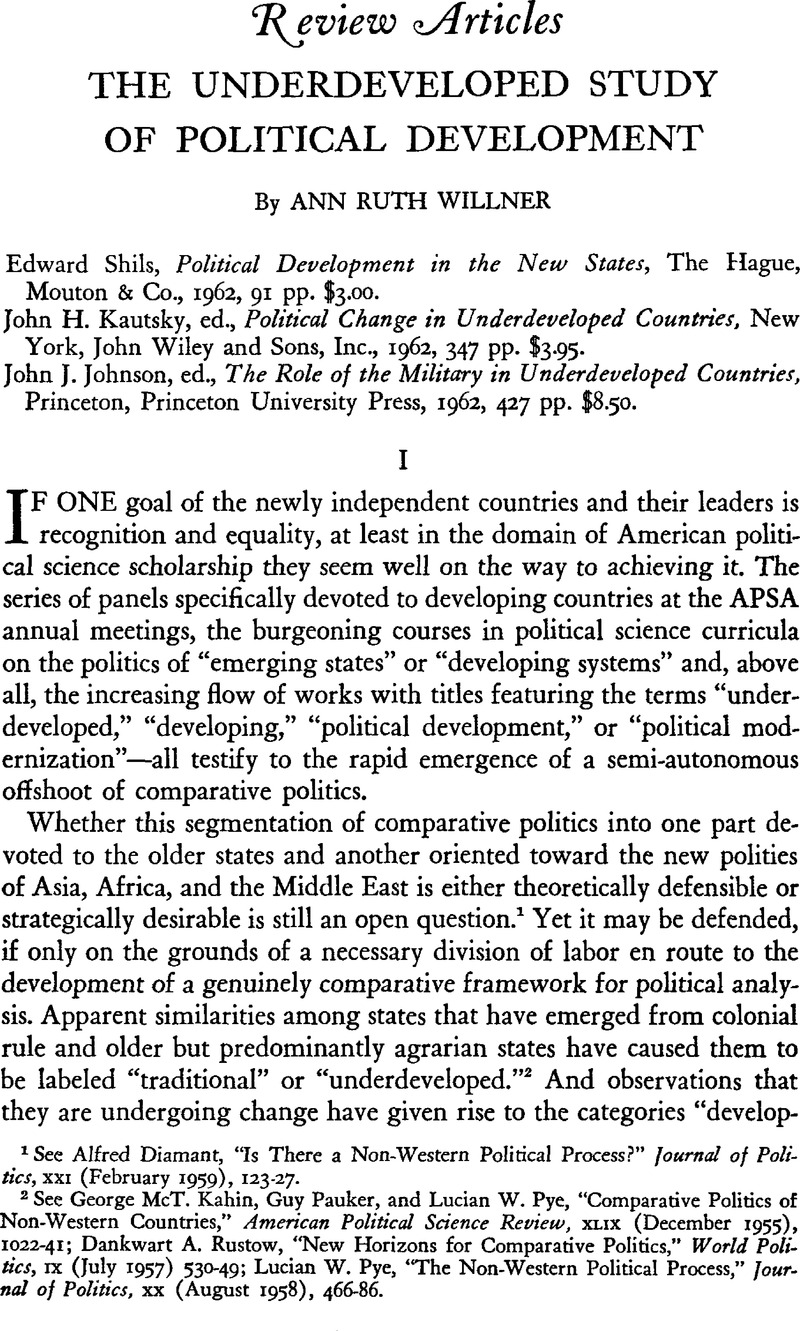Article contents
The Underdeveloped Study of Political Development
Review products
Published online by Cambridge University Press: 18 July 2011
Abstract

- Type
- Review Articles
- Information
- Copyright
- Copyright © Trustees of Princeton University 1964
References
1 See Diamant, Alfred, “Is There a Non-Western Political Process?” Journal of Politics, XXI (February 1959), 123–27CrossRefGoogle Scholar.
2 See Kahin, George McT., Pauker, Guy, and Pye, Lucian W., “Comparative Politics of Non-Western Countries,” American Political Science Review, XLIX (December 1955), 1022–41CrossRefGoogle Scholar; Rustow, Dankwart A., “New Horizons for Comparative Politics,” World Politics, IX (July 1957) 530–49CrossRefGoogle Scholar; Pye, Lucian W., “The Non-Western Political Process,” Journal of Politics, XX (August 1958), 466–86Google Scholar.
3 The danger of unwarranted dichotomy might be averted if some political scientists maintained a foot in either camp to ascertain whether and how long two camps are a desirable division of the conceptual situation.
4 Admittedly, in the flight from single-factor causal analysis, political science is noalone. There is a high degree of substitutability of roles throughout the social sciencesas sociologists count votes and economists seek explanations for innovation in the cultureand-personality theory of anthropologists. See, e.g., Hagen, Everett E., On the Theory of Social Change: How Economic Growth Begins (Homewood, Ill., 1962)Google Scholar.
5 For example, Pye, Lucian W., Politics, Personality, and Nation Building: Burma 's Search for Identity (New Haven 1962)Google Scholar; Binder, Leonard, Iran: Political Development in a Changing Society (Berkeley 1962)Google Scholar.
6 See, for example, the introductory and concluding chapters of Almond, Gabriel A. and Coleman, James S., eds., The Politics of the Developing Areas (Princeton 1960)Google Scholar; Riggs, Fred W., “Agraria and Industria—Toward a Typology of Comparative Administration,” in Siffin, W. J., ed.Toward a Comparative Theory of Public Administration (Bloomington, Ind., 1957)Google Scholar, and “Prismatic Society and Financial Administration,” Administrative Science Quarterly, V (June 1960), 1–46Google Scholar.
7 This essay originally appeared in Comparative Studies in Society and History (1959) and is reprinted in abridged and slightly modified form in The Role of the Military in Underdeveloped Countries.
8 See Millikan, Max F. and Blakmer, Donald L.M., The Emerging Nations (Boston 1961)Google Scholar.
9 For example, Millikan and Blakmer, whose study is by far the best example of this type, restrict their description of the traditional society to a mention of the importance of face-to-face relationships, friendship, family and tribal loyalty, and hierarchal status (p. 5), and the traditional view of politics is briefly equated with the search for status, prestige, and honor (p. 69).
10 See ibid.
11 I still recall the vivid description by an Asian revolutionary leader in the early 1950's of the mobilization of his followers several years earlier to chalk up on public walls as rapidly as possible quotations from Washington, Lincoln, and Jefferson to impress the momentarily expected American mission from whom they sought support.
12 Millikan and Blakmer, 19.
13 This category has since become “modernizing military oligarchy.”
14 See, for example, the concluding chapter in Almond and Coleman. Millikan and Blakmer 's trifold scheme of neo-traditional, transitional, and actively modernizing oligarchies for political development has the advantage of simplicity but is also oversimplified for many purposes.
15 See Pauker, Guy J., “Southeast Asia as a Problem Area in the Next Decade,” World Politics, XI (April 1959), 325–45CrossRefGoogle Scholar.
16 “An Approach to the Analysis of Political Systems,” World Politics, IX (April 1957), 388Google Scholar.
17 For an example of a study that incorporates much of this, see Pye, Politics, Personality, and Nation Building.
- 8
- Cited by


